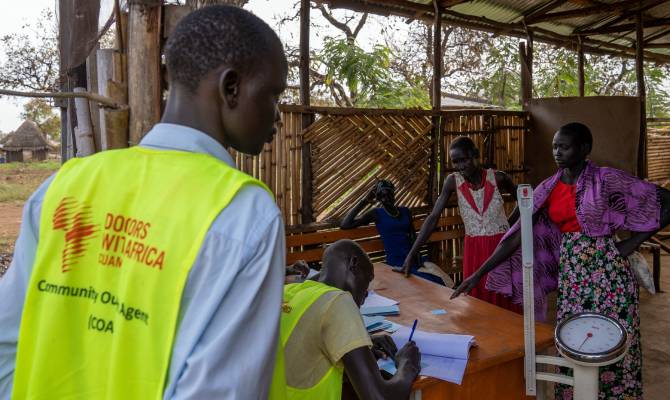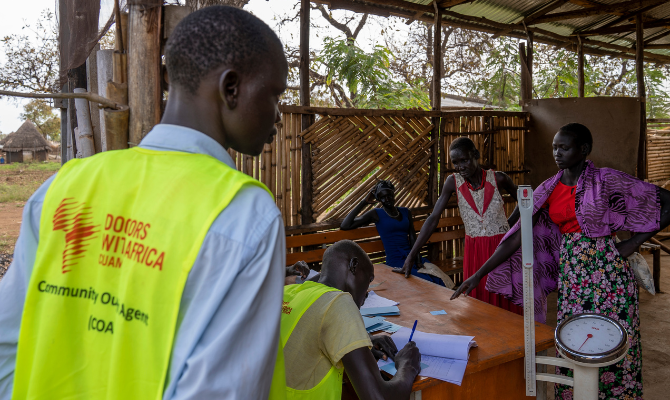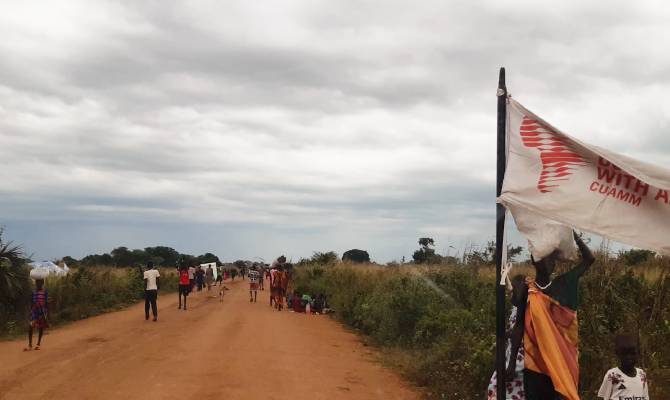While borders and barriers become stronger and stronger across Europe, in 2024, 73% of the world’s refugees found shelter in low- and middle-income countries.
Data are reported in the latest UNHCR report, published ahead of World Refugee Day to shed a light on the lives of people forced to flee.
Uganda is currently among the top hosting countries in Africa. With 1.8 million refugees, it ranks fifth globally and first in Africa. In Uganda’s West Nile region, most refugees come from South Sudan, Sudan, and the Democratic Republic of Congo.
“Conflicts are increasing, and people keep arriving in desperate, emergency conditions,” says Joseph Katetemera, CUAMM Project Manager in West Nile. “Uganda keeps its doors open, even though funding is rapidly declining. To date, overcrowding in camps is a serious issue, and USAID cuts have led to severe underfunding. People must rely solely on their own resilience to survive.”
CUAMM has been working to support refugees in the region since 2022, with the most recent project running through March 2025. The focus has been on providing primary health services, emergency obstetric care, and psychosocial support.
Over the last year alone: 2,777 women gave birth safely, over 14,500 people received care during 100 outreach sessions in villages, 1,042 patients accessed life-saving medications. Special attention was given to people with disabilities, with the construction of accessible latrines, provision of hygiene kits, and inclusive training sessions.
“One of the key achievements, I believe, is that we were able to perform more than 2,000 surgeries on refugees, including over 600 people blinded by cataracts,” says Katetemera. “The story that stays with me most is that of Atizuyo Gladys, a woman who had been blind for eighteen years. Because of her condition, she had lost everything—even the small shop she once ran to support herself. She was ostracized by the community, who believed she had been cursed. Only her family and husband stayed with her. I’ll never forget the day she regained her sight after the surgery: it was the day she saw her children’s faces for the very first time. She even reopened her small business, thanks to a fundraising effort organized in her support.”
Stories like that of Atizuyo give hope in a country where the situation remains critical and the strain is starting to show. And the pressure isn’t limited to Uganda— it also threatens countries like Ethiopia. In Gambella region, near the border with South Sudan, the crisis is deepening. The region currently hosts five refugee camps with over 375,000 South Sudanese, with an additional 50,000 arrivals due to the escalating conflict.
“The situation is truly dire: we’re trying to expand the camps because there’s simply no more space,” explains Daniel Frehun, CUAMM Area Manager in Gambella.

The camps are located in remote areas, often far from water sources and services. Yet CUAMM remains committed. Active in Gambella since 2018, CUAMM currently provides full healthcare services at two health posts in the Ngunyyiel camp and collaborates with community structures in three additional camps.
Activities include: health promotion, preventive care (vaccinations, nutritional screening), treatment, with special attention to women and children. A key initiative is the “tea talks”—informal gatherings led by community health workers, many of whom are refugees themselves, to raise awareness among women of reproductive age.
“These are moments when concerns surface, challenges are shared, and trust is built,” says Daniel.
In a context plagued by recurrent health emergencies—from cholera to the recent Mpox outbreak—the presence of trained personnel and consistent commitment becomes vital.
“Many partners are leaving, but we are staying. Even with fewer resources, we continue working side by side with the community.”
He closes with a message that goes beyond statistics:
“What has struck me most in these four years alongside refugees is their resilience and sense of humanity. I’ve witnessed profound suffering, caused by poverty and repeated health emergencies. Yet they’ve never stopped showing strength, gratitude, and hope. One mother in the Ngunyyiel camp even named her son after ‘CUAMM’, in gratitude for the care she received during her pregnancy.”
“Refugees are not just victims. They are mothers, fathers, and children who once lived in peace and still dream. Today, they continue to support their communities with dignity. We see them, we listen to them, and we walk alongside them.”





